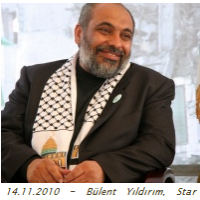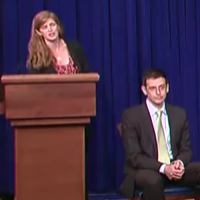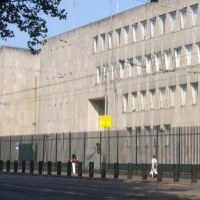![]()
Mon, Jan 03, 2011 | WikiLeaks
WikiLeaks: Yemen President Tells U.S. to Keep its Guantánamo Detainees
Yemen’s president Ali Abdullah Saleh tells America to keep the 120 Yemeni detainees from Guantánamo unless Yemen gets $11m from the US and Saudi Arabia to build a rehabilitation centre in Yemen. His negotiating tactics involve repeatedly asking John Brennan, the US deputy national security adviser, for cash.
Source: WikiLeaks
Monday, 23 March 2009, 07:00
S E C R E T SANAA 000495
NOFORN
SIPDIS
NSC FOR APDNSA JOHN BRENNAN AND JOHN DUNCAN
DEPT FOR S/WCI AMBASSADOR CLINT WILLIAMSON
AND SHAUN COUGHLIN, NEA/ARP ANDREW MACDONALD
EO 12958 DECL: 03/23/2019
TAGS KDRG, PGOV, PINR, PTER, PINS, IZ, SA, YM
SUBJECT: SALEH SHOWS NO FLEXIBILITY ON GTMO DETAINEES
Classified By: CDA Angie Bryan for reasons 1.4(b), (c), and (d)SUMMARY
——-
1. (S/NF) President Saleh on March 16 rejected a proposal by visiting Assistant to the President and Deputy National Security Advisor (APDNSA) John Brennan that Yemeni Guantanamo detainees be sent to a Saudi rehabilitation center jointly run by Saudi Arabia and Yemen. Saleh instead insisted that the Yemeni detainees be returned to Yemen as soon as a proposed rehabilitation center in Aden, funded by the U.S. and Saudi Arabia, is ready to accept them. End Summary.
SALEH INTRANSIGENT ON DETAINEES
——————————-
2. (S/NF) President Saleh on March 16 repeatedly rebuffed suggestions by visiting APDNSA John Brennan that Yemeni Guantanamo detainees be sent to Saudi Arabia, insisting on a Saudi-style rehabilitation center inside Yemen, funded by the U.S. and Saudi Arabia. Brennan, accompanied by the Ambassador, NSC Director John Duncan, S/WCI Ambassador Clint Williamson, and Pol/Mil Chief, told Saleh that the U.S. wanted detainees to return to Yemen eventually. In the absence of a Yemeni program, however, the best near-term solution was for Saudi Arabia and Yemen to jointly run a program, at a Saudi-built rehabilitation facility at Abha in KSA with an immediate capability of receiving up to 120 detainees and open to Arabs from across the region. Saleh refused to address this suggestion directly, saying Yemen would build its own rehabilitation center in Aden. “We will offer the land in Aden, and you and the Saudis will provide the funding.” It will be ready 90 days after receipt of the USD 11 million required for construction, Saleh said.
3. (S/NF) Growing increasingly impatient, Saleh said that the U.S. could duplicate the Saudi program in Yemen. Brennan responded that such a program takes time to develop and that Saleh had his hands full dealing with al-Qaeda in Yemen. Saleh said that while he personally had no problem with detainees being sent to KSA, Yemeni opposition parties are the real obstacle because they will not allow him to give KSA control over Yemeni citizens. Brennan told Saleh that a leader of his depth of experience could surely figure out a way to deal with the opposition,s concerns. Saleh asked why the U.S. didn,t simply keep the detainees at Guantanamo or send them to the “Moayad prison” while Yemen builds its own facility. XXXXXXXXXXXX Signaling his bottom line, Saleh told Brennan that Yemen already had plans for a rehabilitation center and repeated his demand that the U.S. and KSA fund it. At this point, Brennan asked to speak with Saleh and the Ambassador privately.
4. (S/NF) In the pull-aside with Brennan and the Ambassador, Saleh said that he wouldn,t object if the U.S. and Saudi Arabia entered into a bilateral agreement regarding disposition of the Guantanamo detainees. (Comment: Saleh said this knowing full well that the Saudis are unwilling at this point to take in the Yemeni detainees without his concurrence. End Comment.) In a brief meeting outside Saleh’s gazebo, Ambassador Williamson described to Saleh’s nephew, Deputy Director of the National Security Bureau (NSB) Ammar Saleh, the USG’s review process for evaluating possible destinations for detainees and praised the Saudi program. Ambassador Williamson said that Saudi Arabia was closer to Yemen than Guantanamo and that if the Saudi solution didn’t work, then the Yemenis would be transfered to other countries, but not to Yemen. Ammar proposed sending the Yemenis to the ROYG facility for a brief (e.g. 3 month) period at which time Saleh could announce that they had asked to be transferred to KSA, and it would be done. He cautioned that he had not yet proposed the idea to Saleh and that any such transfers would have to be approved by both the family and the tribes involved. Ambassador Williamson thanked Ammar Saleh for his suggestion and said he would take it up with Mr. Brennan, but noted that he did not think it was a viable alternative given the caveats imposed.
RETURN OF THE BAATH IN IRAQ??
—————————–
5. (S/NF) In a bizarre postscript to the morning meeting with Saleh, the Palace protocol office called an hour later to request that Brennan meet with Ammar Saleh. Expecting a continuation of the Guantanamo detainee discussion, the Brennan delegation and the Ambassador met with Saleh, who said that he had been instructed by the President to share “very important” intelligence information with Brennan. Ammar said the NSB had what it considered reliable information that the Iraqi Baath party was reconstituting itself and would reclaim power in Baghdad once the U.S. pulled out. Upon hearing this, Brennan ended the meeting, telling Ammar that he had come expecting to discuss detainee issues, and that he would report to President Obama his disappointment that the ROYG was being inflexible in dealing with the issue. In a final twist, the protocol office called to say that Ammar Saleh would meet Mr. Brennan at the airport as he departed Yemen (raising again the possibility that there could be further discussion of the detainee issue) only to call back to say Ammar Saleh had been called away to another meeting.
ROYG SPIN AND EMBASSY PRESS STATEMENT
————————————-
6. (C) Official news agency Saba released a statement after the meeting saying that Saleh had called on the U.S. to “extradite” Yemeni citizens at Guantanamo to Yemen so they could be rehabilitated and integrated into society. The Saba statement also noted that Brennan had delivered a letter from President Obama praising Yemen’s efforts in counterterrorism and that Saleh had given Brennan a response letter for President Obama. (Note: Brennan did deliver a letter from President Obama, but the letter focused on the danger of transfering detainees directly to Yemen. Contrary to the Saba statement, Saleh did not give Brennan a letter for President Obama. End Note.)
7. (U) The Embassy issued the following press release, cleared by Brennan, the afternoon of March 16.
Begin Embassy press release text:
John Brennan, Assistant to the President and Deputy National Security Advisor, visited Yemen on March 16, 2009 as part of a visit to the region to discuss continued cooperation between the United States and Yemen in combating terrorism. As part of the ongoing dialogue between Yemen and the United States regarding the remaining Yemeni detainees at Guantanamo, Mr. Brennan raised with President Ali Abdullah Saleh the U.S. Government’s concerns about the direct return of detainees to Yemen.
End Embassy press release text.
COMMENT
——-
8. (S/NF) To say Saleh missed a good chance to engage the new Administration on one of its key foreign policy priorities would be a severe understatement. He appeared alternately dismissive, bored, and impatient during the 40-minute meeting. Saleh’s knowledge that Saudi Arabia will not accept Yemeni detainees without at least tacit support from Saleh has likely emboldened the ROYG to press publicly and privately for an all-or-nothing push for the direct transfer of detainees to Yemen. Saleh clearly feels that he has the better hand in any negotiations on the issue. He may have concluded that, if he holds out long enough, the USG will eventually acquiesce to his demands because of the Administration’s timeline for closing Guantanamo in spite of Mr. Brennan’s clear message that the USG is actively seeking alternatives. End Comment.
9. (U) APDNSA Brennan cleared this cable. S/WCI Ambassador Williamson did not have the opportunity to clear this cable. BRYAN



 RSS
RSS












#WikiLeaks: #Yemen President Tells #US to Keep its #Guantanamo Detainees | http://j.mp/eT7KCL
#WikiLeaks: #Yemen President Tells #US to Keep its #Guantanamo Detainees | http://j.mp/eT7KCL http://ff.im/websH
RT @CrethiPlethi: #WikiLeaks: #Yemen President Tells #US to Keep its #Guantanamo Detainees | http://j.mp/eT7KCL http://ff.im/websH
RT @CrethiPlethi: #WikiLeaks: #Yemen President Tells #US to Keep its #Guantanamo Detainees | http://j.mp/eT7KCL
RT @CrethiPlethi: #WikiLeaks: #Yemen President Tells #US to Keep its #Guantanamo Detainees | http://j.mp/eT7KCL